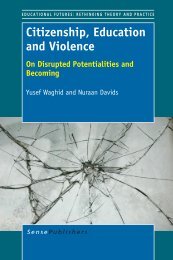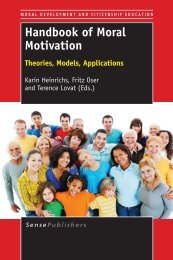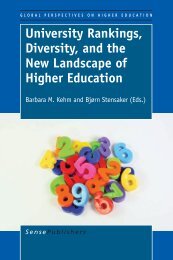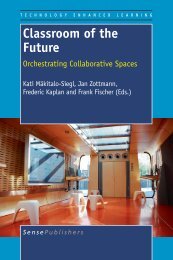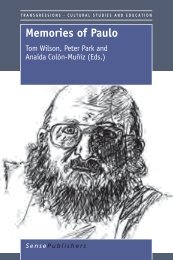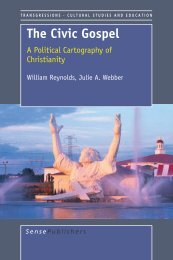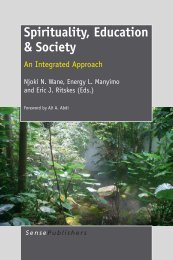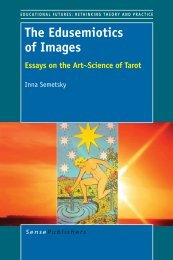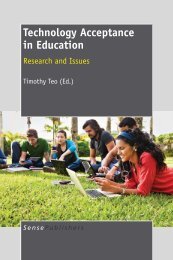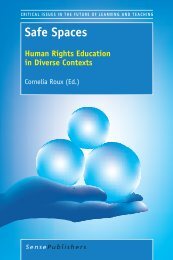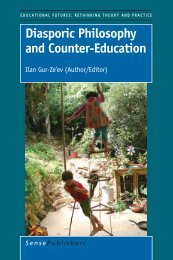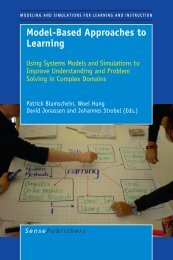Rupturing Concepts of Disability and Inclusion
Rupturing Concepts of Disability and Inclusion
Rupturing Concepts of Disability and Inclusion
You also want an ePaper? Increase the reach of your titles
YUMPU automatically turns print PDFs into web optimized ePapers that Google loves.
CHAPTER 1<br />
How our society responds to such metaphysical challenges becomes critical, <strong>and</strong><br />
therefore forms the basis <strong>of</strong> this research.<br />
10<br />
1.3 THE RESEARCH FOCUS, OBJECTIVES, AND QUESTION<br />
The focus <strong>of</strong> this research is an exploration <strong>of</strong> the ethical significance <strong>of</strong> ‘inclusion’<br />
in the context <strong>of</strong> intellectual disability. This research argues that inclusion <strong>and</strong><br />
exclusion, as concepts influentially shaping human service practices, are complex<br />
socio-ethical constructs informed by, <strong>and</strong> embedded not only in socio-historical<br />
<strong>and</strong> socio-political contexts, but also in the moral structuration <strong>of</strong> a dominant<br />
socio-symbolic ordering <strong>of</strong> the fabrics <strong>of</strong> Western Judeo-Christian societies.<br />
Therefore, critical to any underst<strong>and</strong>ing <strong>of</strong> inclusion <strong>and</strong> exclusion in relation to<br />
people with intellectual disability is the exploration <strong>of</strong> the prevailing normative<br />
ethics which underpin notions <strong>of</strong> right <strong>and</strong> wrong, good <strong>and</strong> bad, just <strong>and</strong> unjust,<br />
beneficent <strong>and</strong> malevolent. The construction, configuration <strong>and</strong> action <strong>of</strong> dense<br />
boundaries, which I name as Selvedges <strong>of</strong> Definition, comm<strong>and</strong> attention. A belief<br />
in a state <strong>of</strong> normality which remains uncritically implicit, becomes contestable.<br />
I contend that an Ethic <strong>of</strong> Normalcy <strong>and</strong> an Ethic <strong>of</strong> Anomaly are applied ethics<br />
(though negative in character), which underpin different social practices for people<br />
with intellectual disability. Dualistically <strong>and</strong> hegemonically structured <strong>and</strong> sustained<br />
by the Selvedges <strong>of</strong> Definition, these ethics are similarly embedded in notions <strong>of</strong><br />
inclusion <strong>and</strong> exclusion, abled <strong>and</strong> disabled, black <strong>and</strong> white, male <strong>and</strong> female,<br />
mind <strong>and</strong> body. They are formed, <strong>and</strong> informed, from matrices <strong>of</strong> patriarchal <strong>and</strong><br />
kyriarchal philosophical, theological <strong>and</strong> social discourses. The challenge emerges<br />
as to whether these dualisms can continue to validly exist in our contemporary<br />
society <strong>of</strong> diversity; <strong>and</strong> if not, then the vapidity <strong>of</strong> such dualisms needs to be<br />
exposed.<br />
It is within these considerations that an ultimate research question emerges:<br />
How ethically defensible is the notion <strong>of</strong> inclusion in relation to people with<br />
intellectual disability?<br />
This research seeks to address critically the inherent orthodoxy <strong>and</strong> dualistic<br />
structurations implicit within the ethical context <strong>of</strong> the multifaceted inclusion/<br />
exclusion relationship. By seeking to rupture the Selvedges <strong>of</strong> Definition, I contend<br />
that the ethical configuration <strong>of</strong> the metaconcepts <strong>of</strong> inclusion <strong>and</strong> exclusion can be<br />
reconceived to a transformatory context <strong>of</strong> integrality. According to The Shorter<br />
Oxford English Dictionary, ‘integrality’ means ‘the condition <strong>of</strong> being integral - <strong>of</strong><br />
wholeness, entirety, or completeness. 39 I argue that if people with intellectual<br />
disability are seen to be valid or authentic ontological subjects <strong>of</strong> a socio-ethical<br />
context <strong>of</strong> Western Judeo-Christian society which celebrates difference within<br />
entirety, concepts <strong>of</strong> exclusion <strong>and</strong> inclusion become redundant by a superseding<br />
concept <strong>of</strong> integrality. ‘A Transformatory Ethic <strong>of</strong> <strong>Inclusion</strong>’, then, is proposed as a<br />
conceptual instrument <strong>of</strong> rupture to promote such change. 40<br />
It is with these intentions in mind, that the research objectives can be stated:



